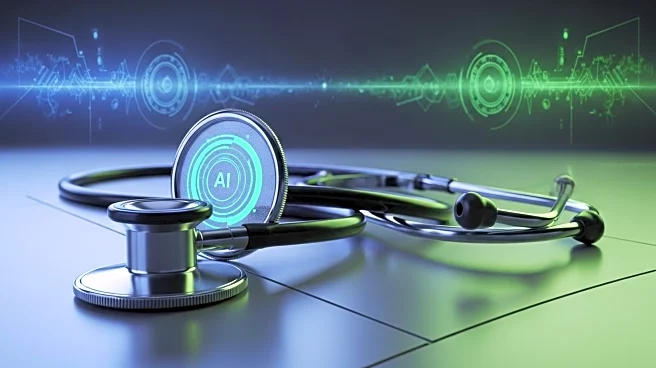What is the story about?
What's Happening?
Doctors at Imperial College London and Imperial College Healthcare NHS Trust have developed an AI-enabled stethoscope capable of diagnosing heart failure, heart valve disease, and abnormal heart rhythms in just 15 seconds. This innovative device, manufactured by Eko Health, uses AI algorithms to analyze subtle differences in heartbeat and blood flow that are undetectable to the human ear. The stethoscope takes an ECG recording and sends the data to the cloud for analysis, with results returned to a smartphone. A study involving 12,000 patients showed that those examined with the AI stethoscope were significantly more likely to be diagnosed with heart conditions compared to those who were not.
Why It's Important?
The AI stethoscope represents a significant advancement in medical technology, potentially transforming how heart conditions are diagnosed. Early detection is crucial for effective treatment, and this tool could enable general practitioners to identify heart issues before they become severe, reducing hospital admissions and healthcare costs. The device could improve patient outcomes by facilitating timely access to necessary treatments, thereby enhancing quality of life and longevity. However, there is a risk of false positives, which could lead to unnecessary anxiety and further testing.
What's Next?
The AI stethoscope is expected to be integrated into clinical practice, particularly for patients presenting symptoms of heart problems. Researchers emphasize its use for symptomatic patients rather than routine checks. As the technology becomes more widespread, it may prompt further innovations in AI-driven diagnostic tools, potentially expanding to other areas of medicine. Healthcare providers and policymakers will need to address the implications of AI in diagnostics, including managing false positives and ensuring equitable access to the technology.
Beyond the Headlines
The development of the AI stethoscope highlights the growing role of artificial intelligence in healthcare, raising ethical considerations about data privacy and the reliance on technology for critical diagnoses. It also underscores the need for ongoing research to refine AI algorithms and improve accuracy. The integration of AI in medical devices may lead to shifts in healthcare delivery models, emphasizing preventive care and community-based diagnostics.

















